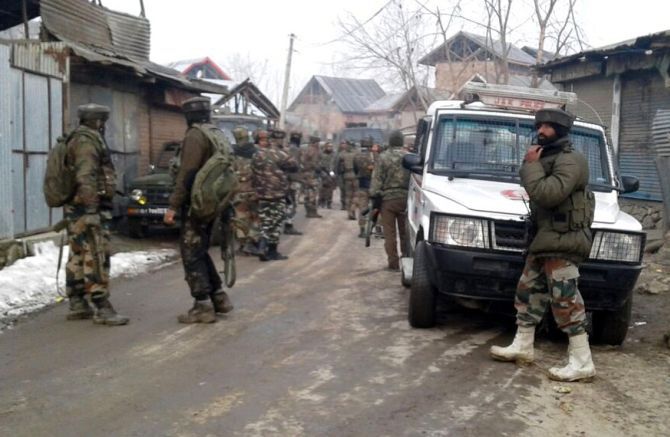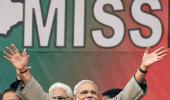'The more harder India pushes its nationalism on to its population, the further away we send Kashmiris.'
'We should understand that the unrest in that state cannot be solved by demonetisation,' says Aakar Patel.
- Lieutenant General Syed Ata Hasnain (retd): General Rawat knows the challenges his men face
- Nitin A Gokhale: The Indian Army is not asking for immunity
- Ajai Shukla: Why civilians confront the army in Kashmir

Counterfeit notes of the new Rs 2,000 denomination are being seized, only weeks after they were introduced.
The first such fake notes were found on November in Gujarat. And now reports of fakes are coming from all over the country.
We were told that one of the reasons for demonetisation was that it would check counterfeit currency and that has turned out to be untrue.
The fake currency issue was tied by the prime minister to violence. He said that demonetisation was being done to check militancy and terrorism.
This was a promise that should not have been made by the prime minister because it showed little understanding of the causes of militancy in India.
Demonetisation happened in the winter months when violence in Kashmir against the army is low.
As the snows are melting, the violence has returned, as it returns every year, and the claims have been shown as being untrue.
Seven soldiers including a major have been killed in recent days in Kashmir. There has not been any lowering in the levels of the militancy because of demonetisation.
This seems to have come as a surprise to the army which was told that demonetisation would check violence against them.
The army chief has made an angry statement, accusing the 'local population' which he says is preventing the army from doing its work and 'at times even supporting the terrorists to escape.'
More worryingly, he has promised that those Indians who display flags of Pakistan and Islamic State would be treated as 'anti-nationals' and that his soldiers would 'get them' and take 'tough action.'
If the army chief and his soldiers spot what they think is a crime, they should report it to the Jammu & Kashmir police. They are not constitutionally authorised to act against flag wavers and slogan shouters.
The army chief, General Bipin Rawat, has also revealed something many Indians may not have known, and that was the hostility to the army from the population in Kashmir.
'As we are conducting operations against them,' he said, 'we find that the local population is somehow not supportive of the actions of the security forces.'
This should be a cause of alarm to the central government, which is also a partner in the state government.
It is one thing to believe that there are elements being sent from across the Line of Control that are causing mischief in Kashmir. It is quite another to admit that the entire population is against you.
That, rightly or wrongly, is what General Rawat is admitting to. 'While our aim has been to conduct people friendly operations,' he said, 'the manner in which the local population is preventing us from conducting the operations, at times even supporting the terrorists to escape... It is these factors which are leading to higher casualties among the security forces.'
The BJP and Congress are now fighting over this statement. But there is no essential difference between them on this issue, as we have seen in the last 30 years.
There is a sameness to the recent events in Kashmir is because the attitude from Delhi and the rest of India is not changing.
Last week a Kashmiri student was acquitted on terrorism charges after he was found to have been in college in Srinagar on the day a bomb went off in Delhi.
The attendance on his college register was marked and so he should not have been charged in the first place but he believes he was scapegoated because he was Kashmiri.
And this was in 2005, when the UPA under Manmohan Singh was in power in Delhi and not the NDA under Narendra Modi.
The more harder India pushes its nationalism on to its population, the further away we send Kashmiris.
We should understand that the unrest in that state cannot be solved by demonetisation. There are much deeper causes.
Unfortunately, it does not appear that the new army chief understands them. He added this statement, aimed at his own citizens: 'Our idea is not to kill these young boys. Our idea is to bring them into the mainstream. But if they wish to remain in this manner, we will target them with harsher measures.'
What possible harsher methods can India use against Kashmiris that we have not used before?
We already use pellet guns to disperse crowds, blinding hundreds, we are charging them with crimes without thinking and we are treating their entire population as criminals.
Whatever other success we claim for demonetisation, it is failing on the count of militancy.
We should accept that and begin considering new solutions that do not treat the issue as a currency problem and one that has internal dimensions as much as it does external ones.
IMAGE: Soldiers at the venue of an encounter in Kralgund, Kupwara, north Kashmir, February 14, 2017. Four soldiers including a major were killed in the firefight, in which four terrorists died. Photograph: Umar Ganie











 © 2025
© 2025